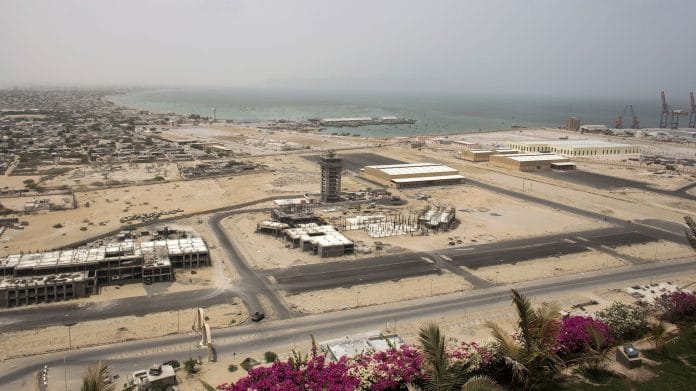A major blast in Karachi on Sunday, 6 October, reportedly killed at least three, including two Chinese nationals, and injured many. While such terror attacks are hardly surprising for Pakistan watchers and may even be business as usual for Islamabad, the stakes for China are much higher.
With strategic interests on the line, such incidents necessitate Beijing to take a decisive stance against terrorism and respond proactively, rather than being selective in its approach to global calls for action. The world, particularly countries affected by Pakistan’s State-sponsored terrorism—including India—may demand this from China, but it may not be ready to act.
The recent incident has drawn strong reactions from China, condemning the attack and expressing condolences to the “innocent victims of both countries”. The Chinese Embassy in Islamabad, confirming the attacks, added that “a convoy carrying the Chinese staff of the Port Qasim Power Company (Private) Limited near the Jinnah International Airport” was targeted.
As an immediate precaution, the Chinese Embassy has warned its citizens in Pakistan to remain “vigilant, pay close attention to the security situation, strengthen security measures, and make efforts to take safety precautions”. From the earliest reports emerging, this was an IED blast and reportedly carried by the Balochistan Liberation Army (BLA)—a separatist militant group fighting for Baloch independence from Pakistan, citing economic and ethnic marginalisation.
Attacks on Chinese nationals
This is the second such targeted attack on Chinese nationals in Pakistan this year. In March, five Chinese engineers were killed near a dam project site in Dasu in the province of Khyber Pakhtunkhwa. BLA is known for its guerrilla tactics like suicide bombings and ambushes, often targeting Pakistani forces and Chinese interests, mainly linked to the China-Pakistan Economic Corridor (CPEC).
The group has not only become a challenge for the Pakistani establishment but China as its so-called CPEC is seen exploiting Balochistan’s natural resources, including gas and mineral reserves.
BLA’s foundational history dates back to the beginning of 2000, emerging from insurgencies and nationalist factions that had unsuccessfully sought greater autonomy or independence in Balochistan.
In recent years, the BLA’s demands have been louder through their attacks targeting Chinese investments across the CPEC as it reflects the failure of the Pakistani Army’s mighty intelligence and the establishment as a whole and resistance to unfair exploitation of natural resources in Balochistan.
What has been more striking is the capacity of the BLA to ignite regional tensions. In January this year, Iran launched missile strikes on Jaish al-Adl—an insurgent group operating out of Pakistan’s border region who were found to have carried attacks on Iranian security personnel. The situation escalated quickly after the Pakistani Army retaliated with a missile strike inside Iranian territory, creating a war-like situation. Tensions subsided after Pakistan Prime Minister Shehbaz Sharif’s three-day visit to Iran in April.
Also read: Chinese influence is growing in Pakistan’s Gwadar. No access for local Baloch people
What do the recent attacks convey?
First, China remains the symbol of exploiting natural resources in Pakistan in the name of strategic cooperation. Beijing’s investments, primarily through the CPEC, are viewed as extracting local resources without benefiting the indigenous population.
The CPEC, while touted as a strategic partnership for economic growth, is seen by the Baloch people as a one-sided deal enriching the Pakistani establishment and foreign interests with little regard for local development or socio-economic upliftment.
Second, the Pakistani establishment has overlooked the concerns raised by the local population in Balochistan and makes no hides on becoming a Chinese satellite region, sacrificing its own regional interests and people’s welfare for short-term geopolitical gains.
The escalation in violence suggests that ignoring these tensions may not only undermine Pakistan’s internal stability but also jeopardise the long-term viability of Chinese projects in the region.
Beijing also holds responsibility for contributing to regional instability. Its sheer ignorance of Balochistan’s regional and cultural dynamics for its strategic gains has contributed to long-term implications.
Beijing needs to understand that by projecting CPEC as a “new momentum to Pakistan’s economic and social development”, it overlooks the exclusion of local stakeholders and treats the province as a mere corridor.
Additionally, Chinese dual standards on Pakistan’s State-sponsored terror industry come with greater costs for Beijing. For decades, China has sided with the Pakistani establishment in protecting terror masterminds at the United Nations, especially those involved in carrying out cross-border terrorism.
Hoping that these same terror organisations would spare Chinese projects and personnel while continuing their violent agendas reveals a dangerous miscalculation that continues to backfire on China’s investments in the region.
As a powerful country in the region that is competing to dethrone American supremacy in global affairs, China cannot be selective in its actions against terrorism in any form. It may be high time for China to join countries in the global call against terrorism, irrespective of its origin.
However, the growing security threats to Chinese assets raise the alarming prospect of Beijing carrying out direct military operations on Pakistani soil to target such groups. It may signal a shift from economic partnership to undermining Pakistan’s sovereignty through its military foothold in the region.
Rishi Gupta is the Assistant Director of the Asia Society Policy Institute, New Delhi. He writes on the Asia-Pacific affairs, strategic Himalayas, and South Asian geopolitics. He tweets @RishiGupta_JNU. Views are personal.
(Edited by Ratan Priya)






